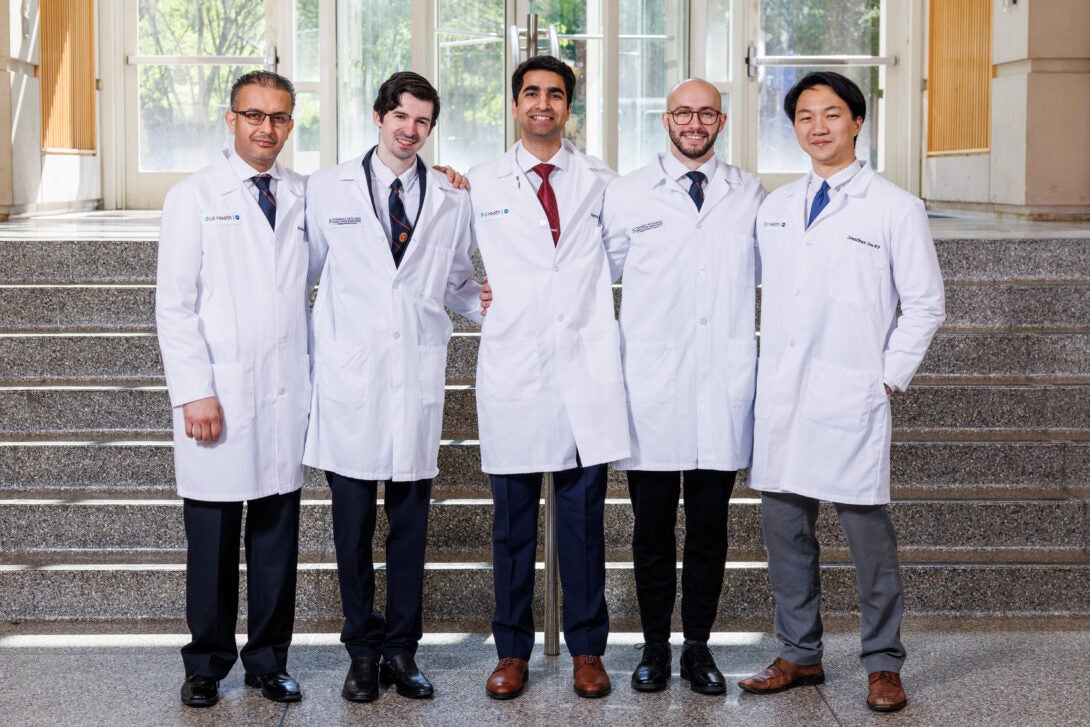Choosing the right residency program is one of the most pivotal decisions a medical student can make. The UIC General Surgery Residency program stands out as a premier destination for aspiring surgeons. This program offers unparalleled opportunities for professional growth, hands-on experience, and a robust curriculum tailored to develop the next generation of surgical leaders.
As the demand for skilled surgeons continues to rise, the University of Illinois Chicago (UIC) has positioned itself as a leading institution for surgical education. With a rich history of innovation and excellence, the UIC General Surgery Residency program offers a comprehensive and immersive experience that prepares residents for both clinical practice and academic research.
Whether you're considering this program or simply exploring your options, this article will provide an in-depth look into what makes the UIC General Surgery Residency unique. From its rigorous training structure to its commitment to diversity and mentorship, we'll explore every facet of this prestigious program.
Read also:Beauty To Go Lasers Transforming The Way We Approach Skincare
Table of Contents
- Introduction to UIC General Surgery Residency
- Program Overview
- Curriculum Structure
- Training and Rotations
- Research Opportunities
- Mentorship and Support
- Diversity and Inclusion
- Application Process
- Funding and Scholarships
- Alumni Success Stories
Introduction to UIC General Surgery Residency
The University of Illinois Chicago General Surgery Residency program is renowned for its commitment to excellence in surgical education. Established to foster the development of skilled surgeons, this program combines rigorous training with cutting-edge research opportunities. Residents benefit from a diverse patient population and access to state-of-the-art facilities.
Located in the heart of Chicago, UIC offers a vibrant environment that supports both personal and professional growth. The program emphasizes patient-centered care, interdisciplinary collaboration, and continuous learning. Residents are encouraged to pursue their interests in various surgical specialties while gaining a solid foundation in general surgery.
What Sets UIC Apart?
UIC's General Surgery Residency program distinguishes itself through its focus on innovation, mentorship, and community engagement. The program prioritizes diversity and inclusion, ensuring that residents are exposed to a wide range of perspectives and experiences. Additionally, UIC's affiliation with top-tier hospitals provides residents with access to complex cases and advanced technology.
Program Overview
The UIC General Surgery Residency program is a five-year training program designed to equip residents with the skills and knowledge necessary to excel in the field of surgery. The program is accredited by the Accreditation Council for Graduate Medical Education (ACGME) and adheres to the highest standards of medical education.
Residents rotate through various hospitals, including the University of Illinois Hospital and Health Sciences System (UI Health), Jesse Brown VA Medical Center, and John H. Stroger Jr. Hospital of Cook County. These institutions provide a diverse clinical environment that challenges residents to think critically and adapt to different patient care scenarios.
Program Highlights
- Five-year curriculum with progressive levels of responsibility
- Hands-on experience in both urban and suburban settings
- Interdisciplinary collaboration with specialists in related fields
- Focus on patient safety and quality improvement
Curriculum Structure
The curriculum of the UIC General Surgery Residency program is meticulously structured to ensure a balanced and comprehensive education. Residents progress through a series of rotations that build upon foundational knowledge and develop advanced surgical skills.
Read also:The Fascinating World Of Speed Of Sound Technologies
In the first two years, residents focus on basic surgical techniques and patient care. The latter years emphasize complex procedures and leadership roles within the surgical team. Residents are also encouraged to participate in research projects and present their findings at national conferences.
Year-by-Year Breakdown
- Year 1: Introduction to surgical principles and basic procedures
- Year 2: Expansion of surgical skills and increased patient responsibility
- Year 3: Advanced surgical techniques and leadership roles
- Year 4: Specialized rotations and research opportunities
- Year 5: Chief resident responsibilities and preparation for independent practice
Training and Rotations
Training at UIC General Surgery Residency is characterized by its breadth and depth. Residents rotate through a variety of surgical specialties, including trauma, transplant, and minimally invasive surgery. These rotations are designed to expose residents to a wide range of procedures and patient care scenarios.
Each rotation is supervised by experienced faculty members who provide guidance and feedback to help residents refine their skills. The program also emphasizes simulation-based training to enhance technical proficiency and patient safety.
Key Rotations
- Trauma surgery at UI Health
- Transplant surgery at Jesse Brown VA Medical Center
- Minimally invasive surgery at John H. Stroger Jr. Hospital
Research Opportunities
Research is an integral component of the UIC General Surgery Residency program. Residents are encouraged to engage in research activities that align with their interests and career goals. The program offers dedicated research time during the third and fourth years, allowing residents to explore topics such as surgical innovation, health disparities, and outcomes research.
Residents have access to world-class research facilities and collaborate with faculty members who are leaders in their respective fields. Many residents publish their research in peer-reviewed journals and present their findings at national and international conferences.
Research Resources
- Access to cutting-edge research facilities
- Collaboration with renowned faculty members
- Opportunities to present research at conferences
Mentorship and Support
Mentorship plays a crucial role in the success of UIC General Surgery residents. The program pairs each resident with a faculty mentor who provides guidance and support throughout their training. These mentors help residents navigate the challenges of residency and develop a personalized career plan.
In addition to faculty mentorship, the program offers various support services, including counseling, wellness programs, and career development resources. These resources are designed to promote resident well-being and ensure a positive training experience.
Support Services
- Faculty mentorship program
- Wellness and counseling services
- Career development resources
Diversity and Inclusion
UIC General Surgery Residency is committed to fostering a diverse and inclusive environment. The program actively recruits residents from underrepresented backgrounds and provides resources to support their success. Diversity is celebrated as a strength that enriches the learning experience and enhances patient care.
The program also offers cultural competency training to ensure that residents are equipped to provide equitable care to all patients. Through these efforts, UIC aims to cultivate a community where everyone feels valued and respected.
Initiatives for Diversity
- Targeted recruitment of underrepresented groups
- Cultural competency training for residents
- Support for diversity-related research and projects
Application Process
The application process for UIC General Surgery Residency is competitive but transparent. Prospective residents must submit an application through the Electronic Residency Application Service (ERAS) and participate in the National Resident Matching Program (NRMP). The program values well-rounded candidates who demonstrate a strong commitment to surgery and patient care.
Applicants are evaluated based on their academic record, clinical experience, letters of recommendation, and personal statement. Selected candidates are invited for interviews, which provide an opportunity to learn more about the program and meet current residents and faculty.
Key Steps in the Application Process
- Submit application through ERAS
- Participate in the NRMP match process
- Attend interviews to learn more about the program
Funding and Scholarships
UIC General Surgery Residency offers competitive stipends and benefits to support residents during their training. The program also provides opportunities for additional funding through scholarships and grants. These resources help alleviate financial burdens and allow residents to focus on their education and professional development.
Residents are encouraged to apply for external funding opportunities, such as research grants and travel awards. The program provides guidance and support to help residents secure these funds.
Financial Resources
- Competitive stipends and benefits
- Opportunities for scholarships and grants
- Support for external funding applications
Alumni Success Stories
The success of UIC General Surgery Residency is reflected in the achievements of its alumni. Graduates of the program have gone on to excel in various surgical specialties, both in clinical practice and academic research. Many have become leaders in their fields, contributing to advancements in surgical techniques and patient care.
Alumni remain connected to the program through a strong network that fosters collaboration and mentorship. This network provides valuable support and guidance to current residents as they navigate their careers.
Notable Alumni
- Leaders in academic surgery
- Practicing surgeons in diverse specialties
- Contributors to surgical research and innovation
Conclusion
The UIC General Surgery Residency program offers a world-class education that prepares residents for successful careers in surgery. With its rigorous curriculum, diverse clinical experiences, and commitment to mentorship and support, UIC stands out as a premier destination for aspiring surgeons.
We encourage you to explore the program further and consider applying if it aligns with your career goals. Share your thoughts and experiences in the comments below, and don't forget to check out other articles on our site for more insights into medical education and career development.




